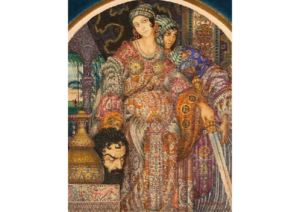This is an archive of special readings prepared for the חג הבנות | Ḥag haBanot (عيد البنات | עיד אלבנאת | Eid el Benat), for the days on which Rosh Ḥodesh Tevet coincide with Ḥanukkah. As Dr. Lori Lefkowitz has written, “On this New Moon…girls are given gifts, sometimes jewelry that would be their inheritance, and special blessings. It is customary to read the story of Judith, and yes, to eat salty cheeses. And one custom that I especially like, girls who were quarreling used the occasion of the festival to kiss and make up.” Click here to contribute a special reading, prayer, or song that you have prepared for the Ḥag haBanot. Filter resources by Collaborator Name Filter resources by Tag Filter resources by Category Filter resources by Language Filter resources by Date Range
The following is the Midrash l’Ḥanukkah, one of a collection of three midrashim and two megillot containing the details of the story of Ḥanukkah in the Jewish rabbinic tradition. Those already familiar with these other works will quickly recognize portions or summaries of them here albeit with precious additional information added not found anywhere else. . . . Categories: Tags: Contributor(s): This digital edition of Midrash Ma’aseh Ḥanukkah was transcribed from the print edition published in Otzar Hamidrashim (I. D. Eisenstein, New York: Eisenstein Press, 5675/1915, p.189-190). With much gratitude to Anat Hochberg, this is the first translation of this midrash into English. . . . Categories: Tags: Contributor(s): “Odekha ki anafta bi (I give thanks to you although you were angry with me) was composed by Joseph ben Solomon of Carcassonne, who is dated to the first half of the eleventh century. This elegant and abstruse poem tells an epic tale of the Jews’ resistance to the decrees of Antiochus IV and includes accounts of both the Hasmonean bride and Judith. It bears a considerable resemblance to texts 4 and 12 of the Hanukkah midrashim (find Grintz, Sefer Yehudit, pp. 205, 207–08) and this is evidence for the circulation of the joint Hasmonean daughter-Judith tales in the eleventh century, even if the surviving manuscripts of these stories are from a later date.” (Deborah Levine Gera, “The Jewish Textual Traditions” in The Sword of Judith: Judith Studies Across the Disciplines (2010).) . . . Categories: Tags: Contributor(s): This is a faithful transcription of the text of the medieval Megillat Yehudith (the Scroll of Judith), not to be confused with the deutero-canonical Book of Judith, authored in Antiquity. We have further set this text side-by-side with the English translation made by Susan Weingarten, and vocalized and cantillated the Hebrew so that it may be chanted. . . . Categories: Tags: 14th century C.E., 52nd century A.M., anti-predatory, dairy foods, derivative work, חג הבנות Ḥag HaBanot, heroic women, High Middle Ages, Judith, Megillat Yehudit, resistance, soporifics, women Contributor(s): A soliloquy in the voice of Judith. . . . Categories: Tags: Contributor(s): |



